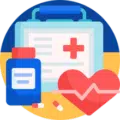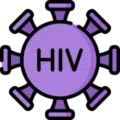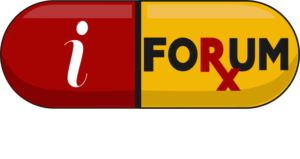Author(s)
Hansita B. Patel, PharmD
Abigail L. Hulsizer, PharmD
G. Blair Sarbacker, PharmD, BCACP
Reviewed By
Shannon Haar, PharmD
James Pitcock, PharmD, BCPS
Benjamin Pullinger, PharmD, BCACP
Kim JM, Stewart R, Lee YS et al. Effect of Escitalopram vs Placebo Treatment for Depression on Long-term Cardiac Outcomes in Patients With Acute Coronary Syndrome: A Randomized Clinical Trial. JAMA. 2018;320(4):350-357.
The Problem
Patients who have had acute coronary syndromes (ACS) are more likely to suffer from major depression than the general population with rates of clinically relevant symptoms of depression as high as 45%.1 Unfortunately, even if patients are routinely screened for depression with a PHQ-2 and PHQ-9 in primary care settings, appropriate treatments are often not initiated for patients who screen positive and have no prior history of depression.2 Some practitioners may be reluctant to start drug treatment because the selection of an appropriate antidepressant in patients that are post-ACS is not straightforward given the potential detrimental impact some antidepressant medications may have on cardiac outcomes. For example, tricyclic antidepressants (TCAs) and certain selective serotonin reuptake inhibitors (SSRIs) have a known effect of causing prolonged QTc.3 On the other hand, depression can lead to decreased motivation which can negatively impact adherence and may actually worsen cardiovascular disease. Depression causes psychological stress which activates the sympathetic nervous system which leads to increased cortisol levels, inflammation, and platelet activation that can contribute to atherosclerosis and accelerate plaque formation.4 Thus, untreated depression may worsen cardiac outcomes. Some data suggest that all-cause mortality rates are nearly two times higher in patients who do not receive treatment for their depression when compared to those who do.5
What’s Known
SSRIs are the recommended first-line agents for the treatment of depression in the general population and are commonly used due to their tolerability and side effect profile.6 Moreover, SSRIs have the most robust data to support their use in patients who’ve experienced a recent ACS event. Currently, there are insufficient data to support the use of serotonin norepinephrine reuptake inhibitors (SNRIs) or bupropion. However, mirtazapine has also been shown to be safe in patients post-ACS in a long-term follow up study of the MIND-IT trial.7 Currently there are no specific recommendations by the American Psychiatric Association for the treatment of post-ACS depression. However, it is important to note that TCAs and monoamine oxidase inhibitors (MAOIs) should be avoided because of their potential to cause cardiotoxic side effects.8
Prior to EsDEPACS trial, evidence regarding the long-term cardiac risks and benefits of SSRIs has been less than compelling. Sertraline appears to be a safe choice for the treatment of depression in patients with ischemic heart disease. The SADHEART trial found that sertraline given to post-ACS patients did not negatively impact left-ventricular ejection fraction (LVEF) or increase the risk in all-cause mortality after nearly 7 years of follow-up.9 However, this trial focused on a surrogate marker for cardiac function and other markers of cardiovascular health such as major adverse cardiovascular event (MACE) rates and re-hospitalizations were not adequately evaluated. In the CREATE trial, citalopram did not adversely impact short-term cardiovascular outcomes but there has been no long-term follow-up study to date. 10
What is New
EsDEPACS was a 24-week randomized, double-blinded, placebo-controlled, single-centered trial originally conducted between May 2007 and March 2013 but with long-term follow-up through June 2017.11 Data assessing major cardiovascular adverse events (MACE) were recently reported for the long-term follow-up study. MACE was defined as a composite of all-cause mortality, myocardial infarction (MI), and percutaneous coronary intervention (PCI). Patients were randomized via block randomization into two groups in a 1:1 ratio. The groups received either escitalopram 5-20 mg (N=149) or placebo (N=151) for 24 weeks. Patient examinations were scheduled at baseline and at weeks 4, 8, 12, 16, 20, and 24. All patients were followed until death or until June 2017 (range 5 – 11 years).
This trial included adult patients with a confirmed diagnosis of ACS (MI or unstable angina) in the prior 2 weeks who have met the Diagnostic and Statistical Manual of Mental Health Disorders, Fourth Edition (DSM-IV) criteria for either major or minor depressive disorder. The investigators excluded patients if their recent ACS event occurred during a hospitalization for which they were admitted for another diagnosis or if it occurred within 3 months of receiving a coronary artery bypass graft. Other exclusions included uncontrolled hypertension defined as a systolic blood pressure (SBP) greater than 180 mmHg or a diastolic blood pressure (DBP) greater than 100 mmHg, a severe or life-threatening illness that could threaten recovery from ACS, or persistent laboratory abnormalities suggesting organ dysfunction.
Table 1: Pertinent Baseline Characteristics of Patients
|
|
Escitalopram (N = 149) |
Placebo (N = 151) |
|
Mean age (yrs) |
60.0 |
60.1 |
|
Men (%) |
59.1 |
61.6 |
|
Beck Depression Inventory Score
|
16 |
17 |
|
DSM-IV diagnosis of major depressive disorder (MDD) (%) |
57.0 |
55.6 |
|
Cardiovascular risk factors (%)
|
60.4 29.5 49.0 39.6 28.9 22.8 5.4 6.0 |
62.3 27.2 47.0 43.0 27.8 21.9 7.3 5.3 |
After a mean of slightly more than 8 years of follow-up, patients who were treated with escitalopram, typically for only 6 months, were significantly less likely to experience a composite event when compared to those who received placebo. The absolute difference between the two groups was nearly 13% with a number-needed-to-treat (NNT) of only 8. This result was largely driven by a significant difference in the rate of myocardial infarction (NNT = 16).
Table 2: Pertinent Results
|
|
Escitalopram (N=149) |
Placebo (N=151) |
P-Value |
HR (95% CI) |
|
Primary Outcome (%) Composite MACE (all-cause mortality, MI, and PCI) |
40.9 |
53.6 |
0.03 |
0.70 (0.51-0.98) |
|
Secondary Outcomes (%)
|
20.8 10.7 8.7 12.8 |
24.5 13.2 15.2 19.9 |
0.43 0.48 0.04 0.07 |
0.82 (0.51-1.33) 0.79 (0.41-1.52) 0.54 (0.27-0.96) 0.58 (0.33-1.04) |
Our Critical Appraisal
This is the first long-term follow-up of a randomized clinical trial to understand the potential long-term cardiovascular benefits (and harms) in patients treated with an SSRI for post-ACS depression. Although, the long-term follow-up to the SADHEART trial did not find a difference in all-cause mortality, no potential cardiovascular benefit was observed.8 It should be noted that this study included patients with both minor and major depression. There was complete retention of all patients who were initially enrolled in the initial trial. Escitalopram therapy was tapered off in the majority of patients after the original 24-week study period. In fact, only 8 patients were still taking an antidepressant 1-year post-ACS event. It is also important to note that patients in the EsDEPACS trial were not on antidepressant therapy prior to experiencing a cardiac event. Because this trial did not evaluate patients already taking an antidepressant, it is reasonable to continue a patient’s prior antidepressant therapy post-ACS so long as it has not been associated with negative cardiac outcomes.8,10
There were a few limitations to this study. Most problematic is that fact that this was a single center study conducted in Korea and enrolled a rather homogenous population.10 Therefore, there is less generalizability to other populations as there may be important differences. Furthermore, only a small number of patients in this study experienced an MI as their qualifying event and very few had a history of MI prior to study enrollment. Therefore, the results might not apply to patients who have experienced multiple cardiac events and at high risk of reoccurrence.
Bottom Line
Selection of appropriate antidepressant therapy is not straightforward given the potential risks associated with some classes of antidepressant medications. Ambulatory care pharmacists can play a vital role in ensuring post-ACS patients are screened for depression and managed with appropriate treatment.8 Escitalopram demonstrated both short-term and long-term cardiac safety for the treatment depression in patients following an acute coronary event. Furthermore, escitalopram may contribute to long-term positive outcomes by reducing major cardiovascular adverse events.10 Thus, escitalopram appears to be not only a safe choice but may also have secondary benefits beyond treating depressive symptoms in this patient population.
The Key Points
- Patients who are post-ACS are at high risk of developing depression.
- Treatment of depression in the acute post-ACS period with an SSRIs appears to be safe.
- Escitalopram lowered the long-term risk of MACE, particularly the risk of MI compared to placebo. Therefore, escitalopram should be considered the preferred option for the treatment of depression in patients following an acute coronary event.
FINAL NOTE: This program will be available for recertification credit through the American Pharmacists Association (APhA) Ambulatory Care Review and Recertification Program. To learn more, visit https://www.pharmacist.com/ambulatory-care-review-and-recertification-activities.
- Huffman JC, Celano CM, Beach SR, et al. Depression and cardiac disease: epidemiology, mechanisms, and diagnosis. Cardiovascular psychiatry and neurology 2013; Article ID 695925.
- Denson BH and Kim RE. “Evaluation of provider response to positive depression screenings and physician attitudes on integrating psychiatric pharmacist services in primary care settings. Mental Health Clinician 2018; 8: 28-32.
- Açikalin A, Satar S, Avci A, et al. QTc intervals in drug poisoning patients with tricyclic antidepressants and selective serotonin reuptake inhibitors. American J Therapeutics 2010; 17: 30-33.
- Dhar AK, Barton DA. Depression and the Link with Cardiovascular Disease. Front Psychiatry 2016; 7: Article 33.
- Smolderen KG, Buchanan DM, Gosch K, et al. Depression Treatment and 1-Year Mortality After Acute Myocardial Infarction. Circulation 2017; 135: 1681-1689.
- American Psychiatric Association. Practice Guideline for the Treatment of Patients with Major Depressive Disorder, 2010: e31-32. http://psychiatryonline.org/guidelines. Accessed May 2019.
- van Melle JP, de Jonge P, Honig A, et al. MIND-IT Investigators . Effects of antidepressant treatment following myocardial infarction. Br J Psychiatry. 2007; 190: 460-466.
- Lichtman JH, Bigger JT Jr, Blumenthal JA, et al. Depression and coronary heart disease. Recommendations for screening, referral, and treatment. A science advisory from the American Heart Association Prevention Committee to the Council on Cardiovascular Nursing, Council on Clinical Cardiology, Council on Epidemiology and Prevention, and Interdisciplinary Council on Quality of Care Outcomes Research. Prog Cardiovasc Nurs 2009; 24: 19-26.
- Glassman AH, Bigger JT Jr, GaffneyM. Psychiatric characteristics associated with long-term mortality among 361 patients having an acute coronary syndrome and major depression: seven-year follow-up of SADHART participants. Arch Gen Psychiatry 2009; 66: 1022-1029.



 iForumRx.org is a web-based community of practice designed to inform ambulatory care pharmacy specialists, pharmacy residents, and student pharmacists about high-quality, practice-changing evidence.
iForumRx.org is a web-based community of practice designed to inform ambulatory care pharmacy specialists, pharmacy residents, and student pharmacists about high-quality, practice-changing evidence.